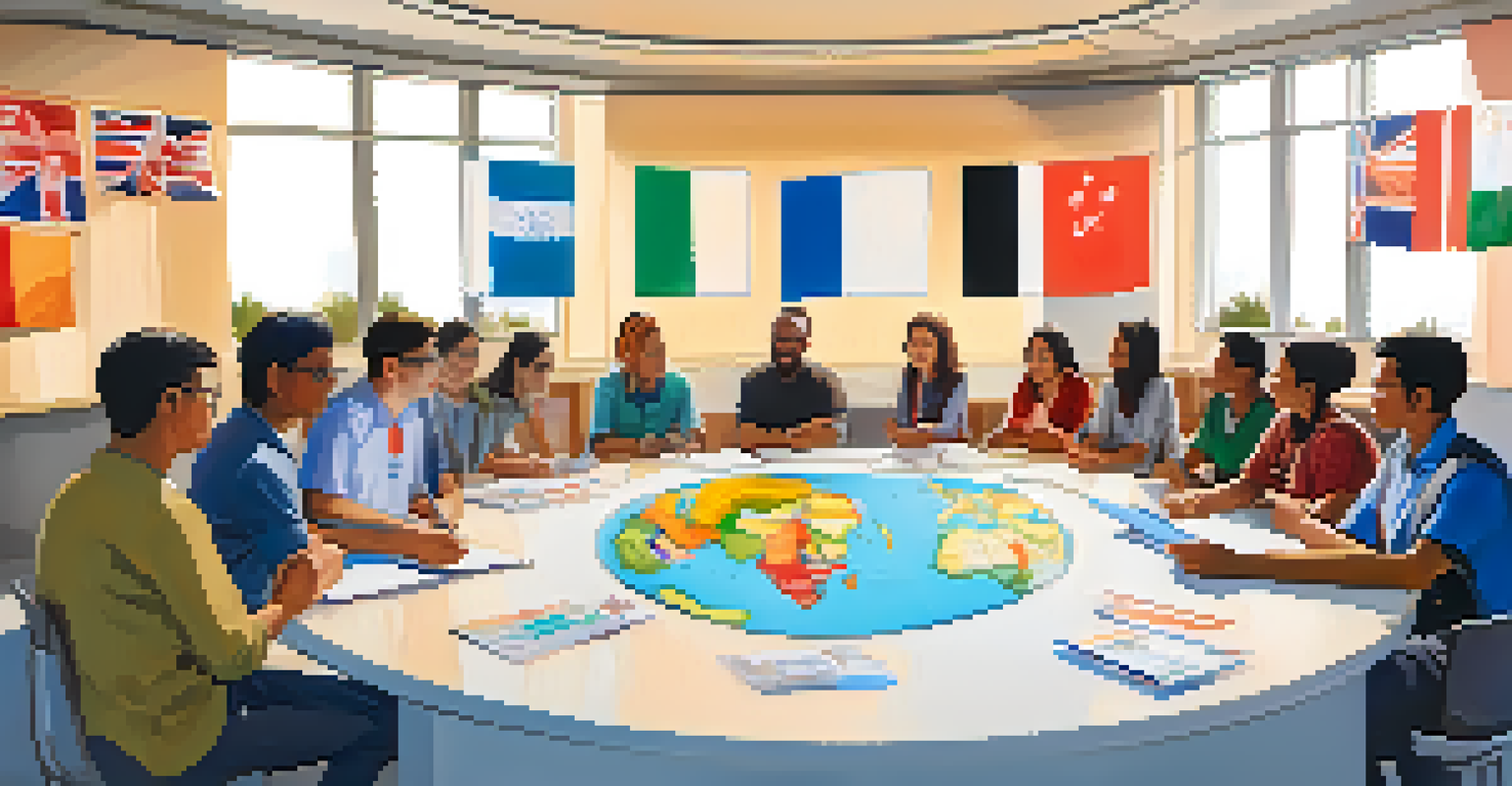Global Education and Ethical Leadership: A New Paradigm

Understanding Global Education in Today's World
Global education goes beyond traditional learning; it emphasizes a holistic understanding of the world. It prepares students to think critically about global issues such as poverty, inequality, and climate change. By fostering a global mindset, education can empower individuals to act as informed citizens in an interconnected society.
Education is the most powerful weapon which you can use to change the world.
In essence, global education teaches students to appreciate diverse perspectives. This appreciation helps them develop empathy and cultural awareness, essential traits for global citizens. For example, students might engage in projects that connect them with peers from different countries, allowing them to share experiences and learn collaboratively.
Through this lens, education becomes a tool for social change. It encourages learners not just to absorb information but to question and challenge the status quo. By equipping them with knowledge and skills, global education can inspire the next generation of leaders to drive meaningful change.
The Role of Ethical Leadership in Education
Ethical leadership is about making decisions that are not only effective but also morally sound. In educational settings, this means prioritizing integrity, fairness, and respect for all stakeholders. Ethical leaders model these values, creating an environment where students feel safe and valued.

For instance, an ethical leader might advocate for inclusive practices that ensure all students have equal access to educational resources. This approach not only fosters a sense of belonging but also prepares students to become fair-minded leaders themselves. By seeing ethics in action, students learn the importance of leading with conscience.
Global Education Empowers Change
It equips students with critical thinking skills and a global mindset to address pressing issues like poverty and climate change.
Moreover, ethical leadership encourages accountability. Leaders who demonstrate transparency and responsibility inspire trust among their students and staff. This trust is crucial for nurturing an educational culture where everyone feels empowered to express their ideas and challenge norms.
The Intersection of Global Education and Ethical Leadership
At the crossroads of global education and ethical leadership lies the potential for transformative change. Both concepts emphasize the importance of understanding and addressing complex global challenges. When combined, they equip individuals with the tools to lead responsibly in a diverse world.
The function of education is to teach one to think intensively and to think critically. Intelligence plus character - that is the goal of true education.
For example, students learning about climate change can explore ethical leadership by discussing the moral implications of their choices. This integration encourages them to consider how their actions impact not just their immediate community but the global environment. It cultivates a sense of responsibility that transcends borders.
This intersection also inspires collaborative initiatives, where students from various backgrounds work together on real-world problems. Such experiences not only enhance their learning but also foster a commitment to ethical leadership. They learn that effective solutions require diverse perspectives and a shared commitment to justice.
Challenges in Implementing Global Education
Despite its benefits, implementing global education presents several challenges. One major hurdle is the varying quality of educational resources across countries. In some regions, access to information and technology is limited, hindering the ability to engage in global learning.
Additionally, there may be resistance to change within traditional educational structures. Some educators might feel overwhelmed by the prospect of integrating global perspectives into their curriculums. Training and support are essential to help them navigate this transition smoothly.
Ethical Leadership Builds Trust
Prioritizing integrity and transparency in educational settings fosters an environment where students feel safe and valued.
Moreover, balancing local and global content can also be tricky. Educators must find ways to connect global issues to students' immediate realities, making the learning meaningful. This requires creativity and a willingness to adapt, ensuring that global education resonates with diverse learners.
The Importance of Collaboration in Global Education
Collaboration is key to successful global education initiatives. By working together, educators, policymakers, and communities can create more effective programs. This teamwork fosters innovation and allows for the sharing of best practices across different contexts.
For instance, partnerships between schools in different countries can lead to exchange programs, enhancing students' cultural understanding. These experiences not only enrich their education but also build lasting friendships that transcend borders. They learn firsthand the value of collaboration in solving global issues.
Furthermore, collaborative efforts can amplify the impact of ethical leadership training. When educators unite to champion ethical practices, they create a stronger, more unified voice for change. This collective approach can inspire students to embrace ethical leadership as a fundamental component of their education.
Measuring Success in Global Education and Leadership
To truly understand the impact of global education and ethical leadership, we need to establish effective metrics for success. Traditional academic assessments may not capture the full spectrum of learning outcomes. Instead, we should look at skills like critical thinking, empathy, and collaborative problem-solving.
For example, surveys and reflective essays can provide insights into students' attitudes toward global issues and ethical leadership. These tools help educators gauge how well students are internalizing the values of global citizenship. Moreover, they can identify areas that need improvement.
Collaboration Enhances Learning
Working together across borders enriches educational experiences and promotes innovative solutions to global challenges.
Additionally, tracking alumni successes can offer valuable feedback on the long-term effects of global education. By understanding how former students apply their learning in the real world, educators can refine their programs. This continuous improvement process ensures that education remains relevant and impactful.
The Future of Global Education and Ethical Leadership
Looking ahead, the future of global education and ethical leadership appears promising yet challenging. As technology continues to evolve, it presents new opportunities for innovative learning experiences. Digital platforms can connect students worldwide, fostering collaboration and dialogue on pressing global issues.
Moreover, as awareness of social justice and environmental sustainability grows, educational institutions must adapt their curricula. They need to incorporate these themes not just as add-ons but as integral components of their programs. This shift will help prepare students to navigate an increasingly complex and interconnected world.

Ultimately, the future hinges on our collective commitment to fostering ethical leadership through global education. By prioritizing these values, we can cultivate a generation of leaders who are not only knowledgeable but also compassionate and responsible. Together, we can create a brighter, more equitable future for all.